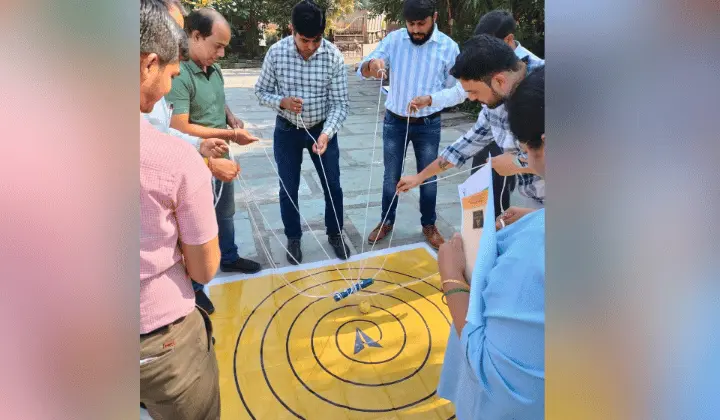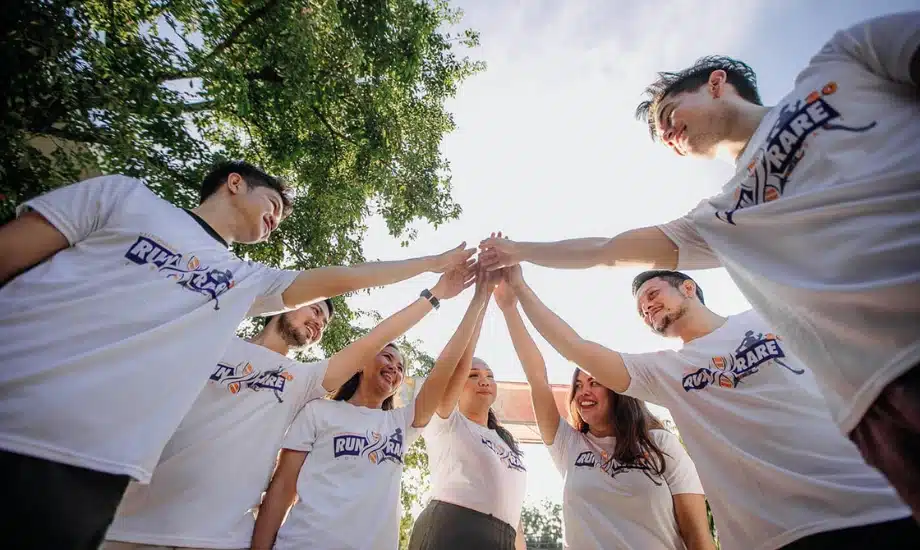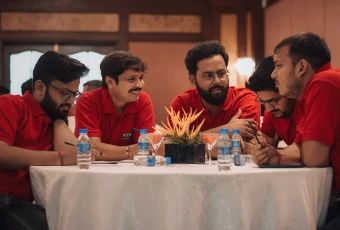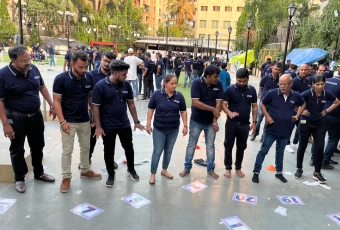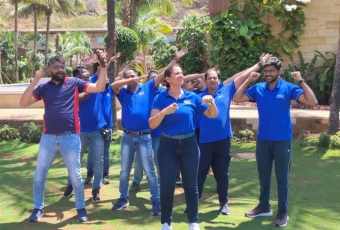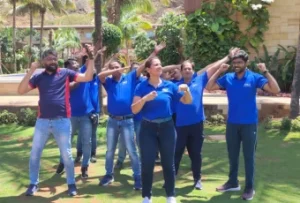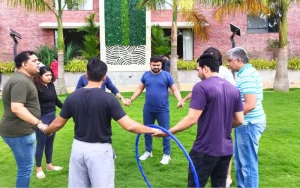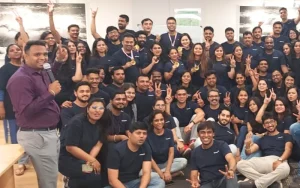Introduction
Team building is important for all businesses big or small as it helps to create a positive work environment, improves communication among team members, and also increases productivity which helps businesses to grow at a faster pace.
Team building activities for small groups in particular help to create better and stronger relationships among employees as they have more opportunities to engage with one another but due to this very nature of personalization and deeper connections in smaller groups team building activities require thorough planning as consideration of individual dynamics becomes extremely important.
Moreover, well-planned and engaging team building activities for employees help discover the hidden talents and strengths of the team members which lays a strong foundation for effective teamwork and collaboration
Here in this blog, we list down 9 fun team building activities for small groups that help improve employee engagement laying a strong foundation for effective teamwork and collaboration.
1. Sell it
In this game, ask the individuals on the team to sell a particular item to the other team members and attach a time limit to it (maybe a minute or two). The person who is able to sell his product to the maximum team members wins the game. This game is really interesting for people who are in the marketing and sales domain.
Benefits –
- Boosts Confidence: Team members gain confidence by practicing their pitch in a nonjudgmental zone among their other team members.
- Encourages Creativity: It helps them to think creatively and make their sales pitch more interesting and fun
- Promotes Fun and Engagement: The competitive spirit among employees and time restrictions make the game exciting and engaging for all the team members.
- Items that can be given to the team members to sell
- A pen
- A water bottle
- A pair of shoes
- A coffee mug
- A notebook
2. Murder Mystery Challenge
This Murder Mystery game can be played even with a large group of 300 people and every member in this game has a significant role to play as each of the team races against time to solve a high-class murder mystery and find the culprit. The case history and background of all prime suspects are given to the team members and then based on all the data points and inputs shared by them, every team needs to come to a conclusion at the end, with strong arguments and evidence about deciding who is the culprit.
Benefits –
- Improves Critical Thinking: Team members get to work on their analytical skills by examining clues and finding solutions.
- Better Communication among employees: Team members communicate in a better way amongst themselves to share various information and work as a team on solving the case.
- Encourages Problem-Solving: The activity puts participants in a spot to think creatively and strategically and look for unique solutions to solve the mystery
3. Team Karaoke
Music and karaoke can be a great way to boost morale and enhance employee engagement, creating great bonds among employees. In this fun event ensure that a no-judgment zone is created so that each employee is motivated to come forward and appreciated irrespective of their skill levels. It can be a memorable and unique way for employees to unwind and connect outside the regular work environment.
Benefits –
- Creates a happy work environment: Music is a great stress buster and helps create a happier and more relaxed environment for the team.
- Team Bonding: Sharing the same taste in music and singing together helps them to connect on a personal level, strengthening interpersonal relationships.
- Encourages Participation: A no-judgment zone ensures that all employees feel comfortable participating, enhancing inclusivity and team cohesion.
4. Bollywood Bubble
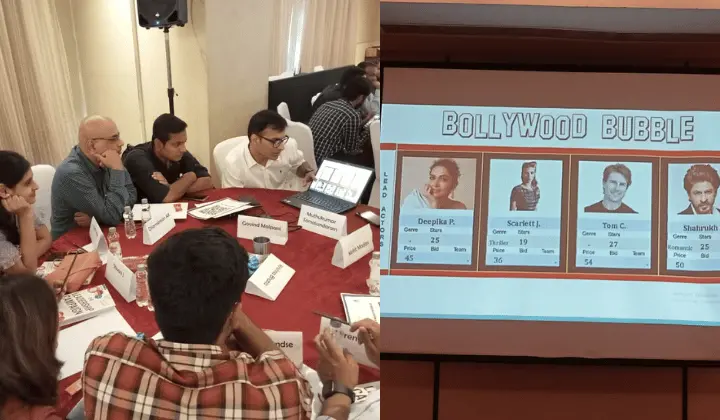
All of us like watching Bollywood movies, right? This game allows the participants to produce a blockbuster movie with their team and solve problems that come their way, like movie clashes at the box office. The game aims to test the leadership skills and problem-solving capacities of the participants and helps them improve collaboration, trust, and teamwork.
Benefits –
- Leadership Skills: Times of crisis help to showcase and develop leadership skills, taking quick decisions and ensuring that everything is for the benefit of the team helps to sculpt strong leaders for the future.
- Problem Solving: Different hurdles help improve problem-solving skills and ensure that the team is thinking out of the box to find unique solutions.
- Collaboration and Trust: People from different teams collaborate to solve the hurdles. This helps build trust and improves collaboration among all the team members.
5. Childhood Dreams
Each one of us had some unique dreams during our childhood. We wanted to be a doctors one day and a pilot on another. But, how many of us actually were able to fulfill our childhood dreams? This game can be a sweet and fun trip down memory lane. Ask everyone in the team to write their childhood dreams and discuss what has changed and what they have become now.
Benefits –
- Develops Deeper Connections: Sharing personal stories helps team members understand each other better, and creates empathy and deeper connections.
- Encourages Vulnerability: Discussing personal dreams and aspirations encourages openness and trust within the team.
- Promotes Reflection: Reflecting on past dreams and current realities can be a powerful exercise in self-awareness and personal growth.
- Boosts Morale: Reminiscing about childhood dreams can be fun and uplifting, boosting team morale and positivity.
6. Meri Awaaz Suno
A circle of 20 ft radius is created with one or two of the participants (per team) inside it, both blindfolded and surrounded by different spare parts. Two coordinators are made to stand at a distance outside the circle, facing the other team members, who are 20 feet away from these coordinators.
The catch is that these team members are not allowed to speak but can see the circle and where the resources are kept. So, they have to convey the task to the coordinators, who will, in turn, guide the blindfolded participants verbally within the circle to build a structure out of the spare parts.
Benefits –
- Strengthens Bonds: Communicating verbally creates an understanding among team members, strengthening bonds and creating a sense of belonging.
- Promotes Communication: This game encourages better communication and listening skills as all the commands are given verbally to the participants leading to improved collaboration and teamwork.
- Builds Trust: Following the instructions of the coordinators builds trust and mutual respect within the team, creating a supportive and inclusive environment.
7. The Weirdest Thing
Ask all the team members to share the weirdest thing they own or the weirdest thing they have ever eaten. It allows the team members to share something funny from their personal lives and acts as a perfect icebreaker. They can also talk about the situation or the instances that led to the particular incident and make the session more engaging and fun.
Benefits –
- Great Icebreaker: Sharing funny stories in a team acts as a great icebreaker, as it helps them to relax and connect with each other on something outside work.
- Laughter Riot: Hearing hilarious stories from colleagues spreads laughter and boosts employee morale, creating a positive working environment.
- Promotes Storytelling: Team members have the opportunity to improve their storytelling skills and share personal experiences, creating a sense of openness and trust within the team.
- Strengthens Bonds: Sharing funny and memorable moments builds bonds among the team members and the experiences shared bring them closer together.
8. Roller Coaster
Teams experience the thrill of working together with other teams. In the beginning, the entire group is divided into smaller teams, and each team is given a task to build an individual roller coaster and meet specific requirements given to each member of the team they have to take on a different role, such as the leader, structural designer, or purchase manager, etc.
Throughout this challenge, teams will experience various ups and downs of the roller coaster-building process, from ideation and design to execution and testing. The thrill of seeing the roller coaster in making and achieving the end goal together will be an experience to remember for all the participants.
Benefits –
- Promotes Creativity: Since each time has to build a unique rollercoaster as per the requirements it encourages team members to showcase their creativity while building the rollercoaster.
- Quick Decision Making: Since there are various hurdles that can come midway, the team leader needs to ensure that correct decisions are taken quickly as per the situation.
- Strengthens Team Bonds: Sharing roles and working towards a common goal, helps build connections and relationships among all the team members, creating a sense of unity.
- Encourages Problem-Solving: Challenges are thrown mid-way for the team to improve their problem-solving skills and ensure that the end goal is achieved irrespective of the hurdles.
9. Tough Deal
This is another interesting team building activity where each team is given a different role -cricket team owners or talent agencies and are given access to different sets of information. The goal of this challenging game is to find a beneficial solution for all the members involved, which encourages teams to work together and find unique and creative solutions.
Benefits –
- Improves Communication among members: Team members constantly communicate with each other to find solutions that are beneficial for everyone, this improves teamwork and communication among all the members
- Leadership Skills: As each team member is given a different role it helps to develop leadership skills of various individuals and gives them a chance to manage a team in an informal setting.
- Strategic Thinking and Negotiation: The team needs to think out of the box, build a strategy, and reach a unique solution that is beneficial for everyone, this helps the team to understand the concept of negotiation and reach a common ground.
Conclusion
Team building activities for small groups are important for strengthening bonds, improving communication, and encouraging cooperation among all the team members. Along with getting to know each other better through these various activities, the team members build the trust that is necessary to work in a collaborative and productive group. By participating in funny games, sharing personal stories, or showing their creativity and hidden talents, these team-building exercises give participants the chance to overcome obstacles as a group, and collaborate to achieve their common goals in the organization.
But, the advantages of team building are more than just improving the relationship of the team members. These activities actually help build a supportive workplace where the entire team is inspired to succeed at work and feel encouraged and appreciated. High morale, a higher level of involvement, and a strong bond built on success among team members all result in improved levels of productivity and job satisfaction. It also develops a culture of creativity and constant development within the team because everyone feels empowered to work together. And, planning team-building activities for small groups is actually an investment in the organization’s growth and improvement in overall performance. Through the prioritization and formation of robust and cooperative teams, organizations are able to discover the full potential of their workforce and attain higher standards of productivity, creativity, and prosperity.

